Samsung Galaxy Ring vs Oura Ring — everything we know so far
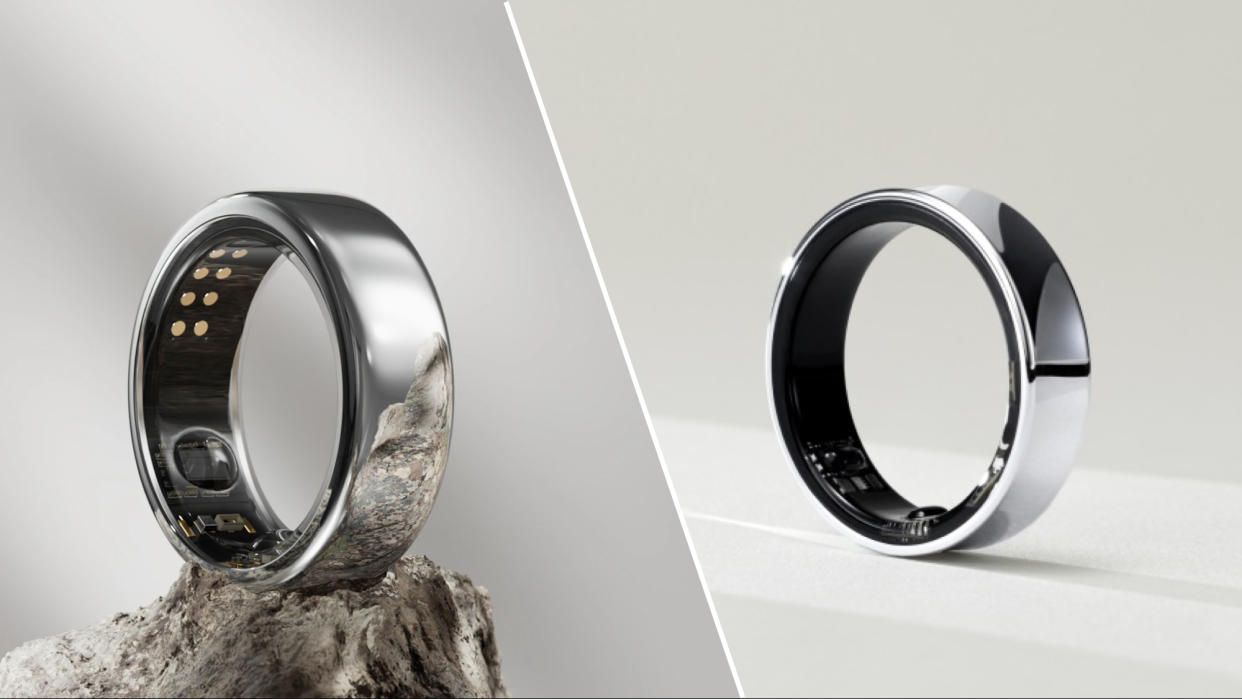
Samsung’s been teasing it for a while, but it now looks like the Samsung Galaxy Ring will launch this summer, and we’re starting to get our first glimpses of the tech inside the company’s miniature wearable. But how will it stack up against the current market leader, the Oura Ring?
After all, the Samsung Galaxy Ring has a lot to live up to. The third-generation Oura Ring is one of the best fitness trackers available right now, it comes in several finishes and can track your sleep, measure your heart rate, respiratory rate, and body temperature.
From what we’ve heard, though, the Galaxy Ring may match up well. And, of course, since it's 2024, it’ll also use AI to help make sense of the data and turn it into actionable tasks for you to look after your health and body. So, here’s what we know so far about the Samsung Galaxy Ring vs Oura Ring.
Samsung Galaxy Ring vs Oura Ring: price
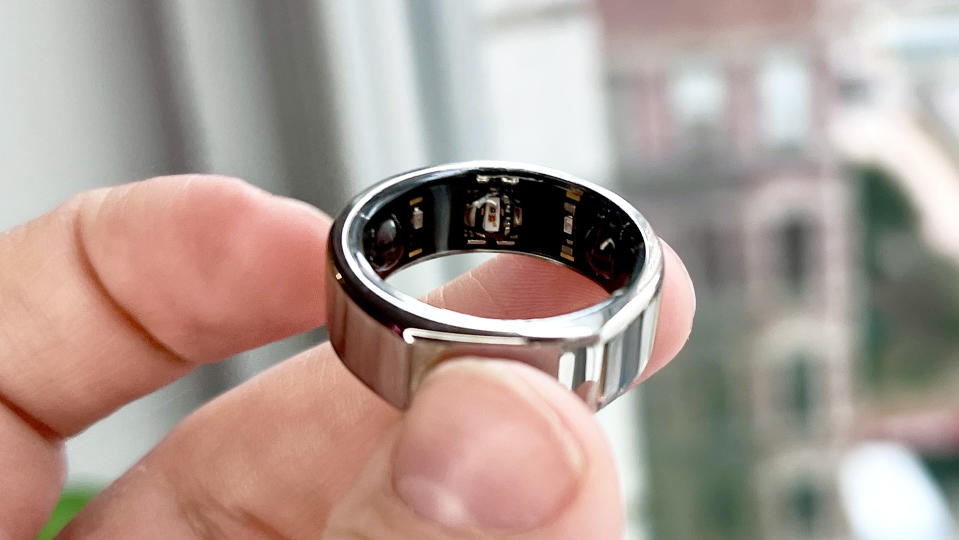
Samsung hasn’t revealed any prices for the Galaxy Ring so far, but we can assume it’ll be around the same cost as the Oura Ring, which retails for $299. You also need to take out an Oura Membership for $5.99 per month to get personalized insights and live heart rate tracking.
However, a recent leak suggests that the Galaxy Ring may cost between $300 and $350, with a $10 per month subscription fee for additional services. This would make the ring and subscription slightly more expensive than Oura's offering.
We can’t say for sure that Samsung will actually take a this approach, but it also looks like the company intends to integrate the Galaxy Ring with the Samsung Health app, a free alternative to Apple Health and Google Fit for Samsung phone owners.
Of course, they could take the Fitbit route, and launch a service like Fitbit Premium inside Samsung Health. In that case, there may be some limited data viewable in the app for free, but you’d need a subscription for detailed analysis and recommendations.
Samsung Galaxy Ring vs Oura Ring: design
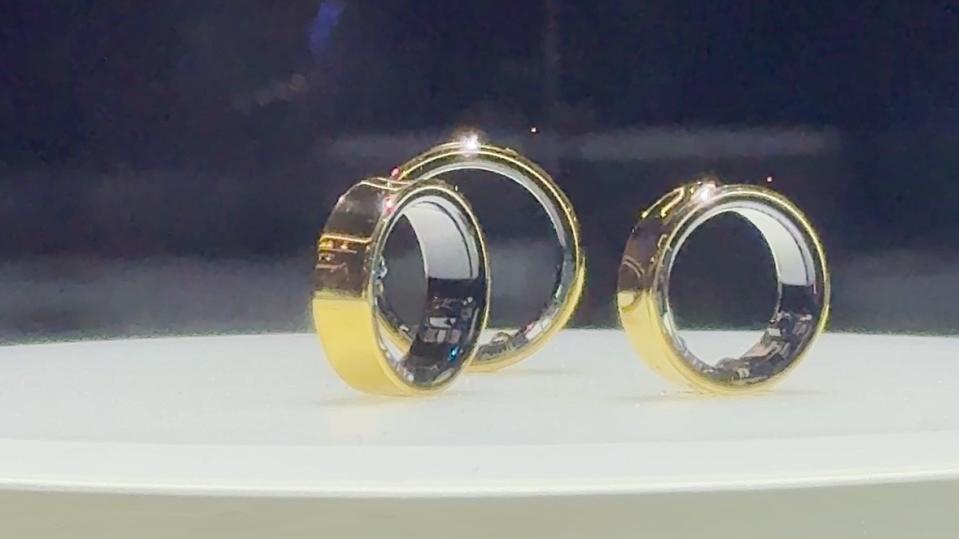
Our first in-person preview of the Galaxy Ring was at MWC in February, where the company locked a few of the smart rings in several colors in a glass box. So, we don't know how it feels to wear, but we do know that it looks a lot like the Oura Ring, which isn’t too surprising.
After all, you want a ring to be subtle, so Samsung has come up with three designs — Black, Gold, and Silver — so you do have some degree of personalization. Meanwhile, the Oura Ring is available in Silver, Black, Gold, and Stealth, so Samsung may be taking design cues from Oura here.
The Oura Ring is also extremely comfortable to wear all day, and it's lightweight enough that you can pop it on and forget about it. While reviewing the Oura Ring, we even accidentally tested out the ring’s waterproofing after it fell into the laundry and emerged unscathed.
While we don’t know for sure, it’s a fairly safe bet that the Galaxy Ring will also be waterproof to some degree — it would be a pain if you had to take it off every time you cleaned your hands, washed the dishes, or did a sweaty workout.
Despite the small size of both trackers, we have some detail on how long the battery will last. The Oura Ring can go up to a week, although we found it is closer to five days in practice. And, according to a report from Android Authority, the Galaxy Ring will have a "long" battery life, so could even outlast the Oura Ring.
Adding weight to that claim is that Samsung's VP of digital health, Dr. Hon Pak, reportedly said that the Galaxy Ring will achieve 9 days of use between charges, outperforming the Oura Ring by two days.
Samsung Galaxy Ring vs Oura Ring: features
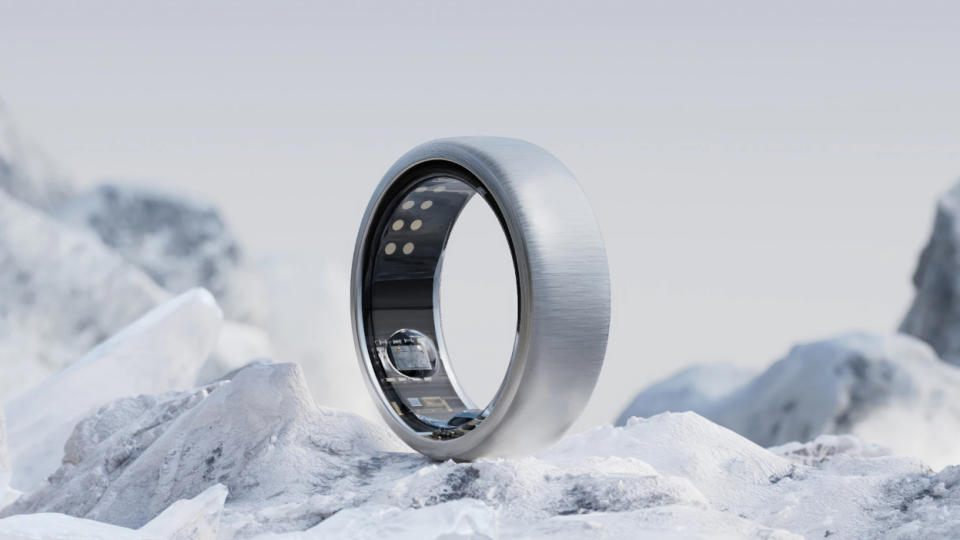
The first-generation Oura Ring was more like a fitness tracker without a display, but the latest edition takes a more holistic approach, designed to help you monitor your activity, but also how you feel physically and mentally using 20 biometric signals captured by its various sensors.
So, like the best Fitbits, you can track your steps, calorie burn, and overall activity levels. However, it doesn’t support workout tracking, so you either need a separate smartwatch or fitness tracker, or log your sessions in Apple Health or Google Fit and sync them to the Oura app.
According to ETNews, the Galaxy Ring will have an ECG sensor for monitoring your heart health and could be used to detect atrial fibrillation (irregular heart rhythm), but features like that need to be approved by the FDA, so they might not be available at launch.
But it’s reasonable to expect that the Galaxy Ring will also cover the fitness tracking essentials, like step counting, heart rate monitoring, and sleep tracking. Most wearables also now offer some degree of female health tracking and cycle monitoring, so that’s likely on the Galaxy Ring too.
This would be in step with the Oura Ring, which integrates with the birth control app Natural Cycles, to track your menstrual cycle. The ring measures your temperature in the morning, and syncs that to Natural Cycles to inform your daily fertility status.
It’s impressively accurate, as our fitness editor found that the Oura Ring actually saw signs of her pregnancy before she did. Samsung has a similar partnership with Natural Cycles on some of its Galaxy smartwatches, including the Samsung Galaxy Watch 6, so it's reasonable to assume this will extend to the Galaxy Ring too.
And, according to a recent teardown of the Samsung Health app, it looks like the company may expand this to period predictions too, alongside snore detection and skin temperature readings (which factor into the fertility and menstrual tracking).
As the competition between the two brands heats up, Oura has continued adding features to its existing models, like the Cardiovascular Age and Cardio Capacity heart health monitoring rolled out in May 2024. Plus, Oura launched Labs, so you can try new features before they're ready for the masses.
Samsung Galaxy Ring vs Oura Ring: compatibility
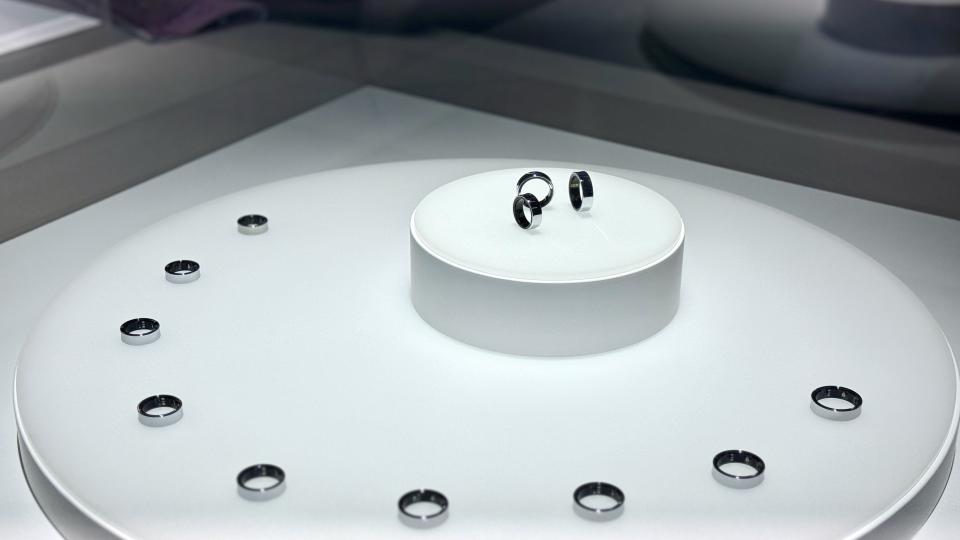
The Oura Ring is designed to work with iPhones and Android smartphones, but the Samsung Galaxy Ring will likely take a different approach. Based on the information we have so far, Samsung has been very clear that it intends to build a Galaxy ecosystem around the Health app.
In that sense, they’re following in Apple’s footsteps — you’ll buy a Samsung Galaxy smartphone, wear a Galaxy Watch (possibly even the much-rumored Galaxy Watch 7) for workouts, and track your overall activity and sleep using the Galaxy Ring, with all the data easily accessible in the Samsung Health app.
So, while the design of the Galaxy Ring definitely positions it as an Oura Ring competitor, Samsung sees it as a way to passively gather data that you can use as part of the wider Galaxy ecosystem to improve your health and well-being, rather than a standalone device like the Oura.
And, according to a post in the Samsung Newsroom, the company hopes to use AI-powered insights to give actionable recommendations in the Samsung Health app, like the new My Vitality Score, based on the data gathered by your various Samsung devices, which also suggests an ecosystem-style approach.
Samsung also seems to be giving all of its products an AI-focused makeover, as several anticipated AI health and fitness features are tipped for the new Galaxy watches, lending support to the idea that you wear the watch and ring in tandem.
Samsung Galaxy Ring vs Oura Ring — which comes out on top?
Whether you pick up the Oura Ring right now or wait for the Samsung Galaxy Ring in the summer will likely depend on whether you own a Samsung phone. It’s clear that Samsung is emulating Apple’s approach and creating a seamless ecosystem of gadgets, data, and software.
We don’t have confirmation at this point that the Galaxy Ring will be locked to Samsung phones, but it’s a reasonable assumption. So, if you’re a fan of the ring form factor to keep tabs on your health and well-being but use an iPhone or other Android device, the Oura Ring is the better option.
However, the Oura Ring’s true cost is higher than its $299 price tag. To get the most from the wearable, you’ll also need to take out the $5.99/month membership to get access to personalized insights, which is a feature that may be available free of charge in the Samsung Health app.
But at this point, there’s still so much we don’t know about the Samsung Galaxy Ring, so if you don’t want to wait another half year before taking action, the Oura Ring is a solid option for tracking your activity and sleep without tying yourself into a specific brand’s ecosystem.
However, if you're after an non-Oura ring and don't want to wait for Samsung to actually get its wearable out the door, the Amazfit Helio Ring launched in May 2024. We've been trying it out and our first impressions of the Helio Ring are pretty positive, so both popular brands could be in for some stiff competition.


